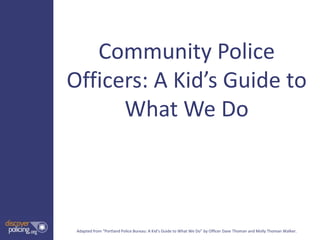
Kids Guide to Community Policing
- 1. Community Police Officers: A Kid’s Guide to What We Do Adapted from “Portland Police Bureau: A Kid’s Guide to What We Do” by Officer Dave Thoman and Molly Thoman Walker.
- 2. What is a community police officer? A community police officer is a person who works with people to solve problems. They help keep your city a safe place and protect people from crime.
- 3. Did you know? Many police departments serve their communities in many other ways.
- 4. Who can be a community police officer? Men and women can be community police officers. Police departments set different rules for who can be a community police officers. Usually, you have to be at least 21 years old and have graduated from high school or have gone to college. You can ask your local police department what their rules are for becoming a community police officer.
- 5. Did you know? Police officers meet every day before they start work. This meeting is called roll call.
- 6. What training does a police officer have to complete? Police officers must attend a special kind of school called an academy. Depending on what kind of department and where the department is, there are different kinds of classes officers must attend. After police officers graduate from the academy they will ride with an experienced officer who will help them learn.
- 7. What tools do police officers use? Most police officers wear a uniform and a badge. Different types of officers wear different uniforms. Police officers carry their tools on a duty belt. They also wear body armor under their uniforms to protect them. Did you know? A police officer’s duty belt and body armor weighs about 28 pounds!
- 8. What do community police officers do? Community police officers watch over neighborhoods and talk to people in the community. They answer radio calls from dispatchers and sometimes take people to jail.
- 9. There are many different types of police officers. Let’s explore some of the different jobs police officers do.
- 10. School resource officers watch over schools and help keep students safe. School resource officers help students and teachers solve problems. The officers also sometimes train safety patrol students.
- 11. Traffic officers make sure that people drive safely. They use cars and motorcycles to do their job. Traffic officers also investigate car crashes.
- 12. Some officers ride bikes to patrol their city or town.
- 13. A K9 officer has a dog for a partner. The dogs use their sense of smell to find things. K9 officers and their dogs go through very special training. Did you know? The dog lives at home with the officer and officer’s family.
- 14. Mounted patrol officers ride horses. The officers and horses get special training to do police work. Did you know? If the horse poops on the sidewalk, the officer scoops it.
- 15. Transit police officers patrol trains and buses. They also keep the bus stops and platforms safe.
- 16. Criminologists take pictures at crime scenes. They collect fingerprints and evidence to help solve crimes. Did you know? No one has the same fingerprint as you!
- 17. Detectives investigate crimes. They interview people to find out what happened. Detectives usually do not wear uniforms or drive patrol cars.
- 18. Who helps police officers? Many people work in police departments who are not officers. They take care of lost or stolen property, help people who come into police stations, keep track of reports, and do many other jobs. They help police officers by making sure the officers have the right tools and information to do their jobs.
- 19. What happens with I call 9-1-1? When a person calls 9-1-1, a dispatcher answers the phone. The dispatcher types all of the information into the computer and calls police officers on the radio. The dispatcher tells the police officers where to go and who needs help.
- 20. Tips to Help Keep You Save • Always make sure your parents know where you are. • You can call 9-1-1 from any phone if there is an emergency. • Memorize your address, phone number, and parents’ names. • Always wear a fastened helmet when you’re riding a bicycle, skateboard, or scooter. • Don’t talk to strangers, take anything from them, or go anywhere with them. • Cross the street only at corners or crosswalks and look both ways before you cross. • If you see a gun or weapon, STOP. Don’t touch it. Get away and tell an adult.
